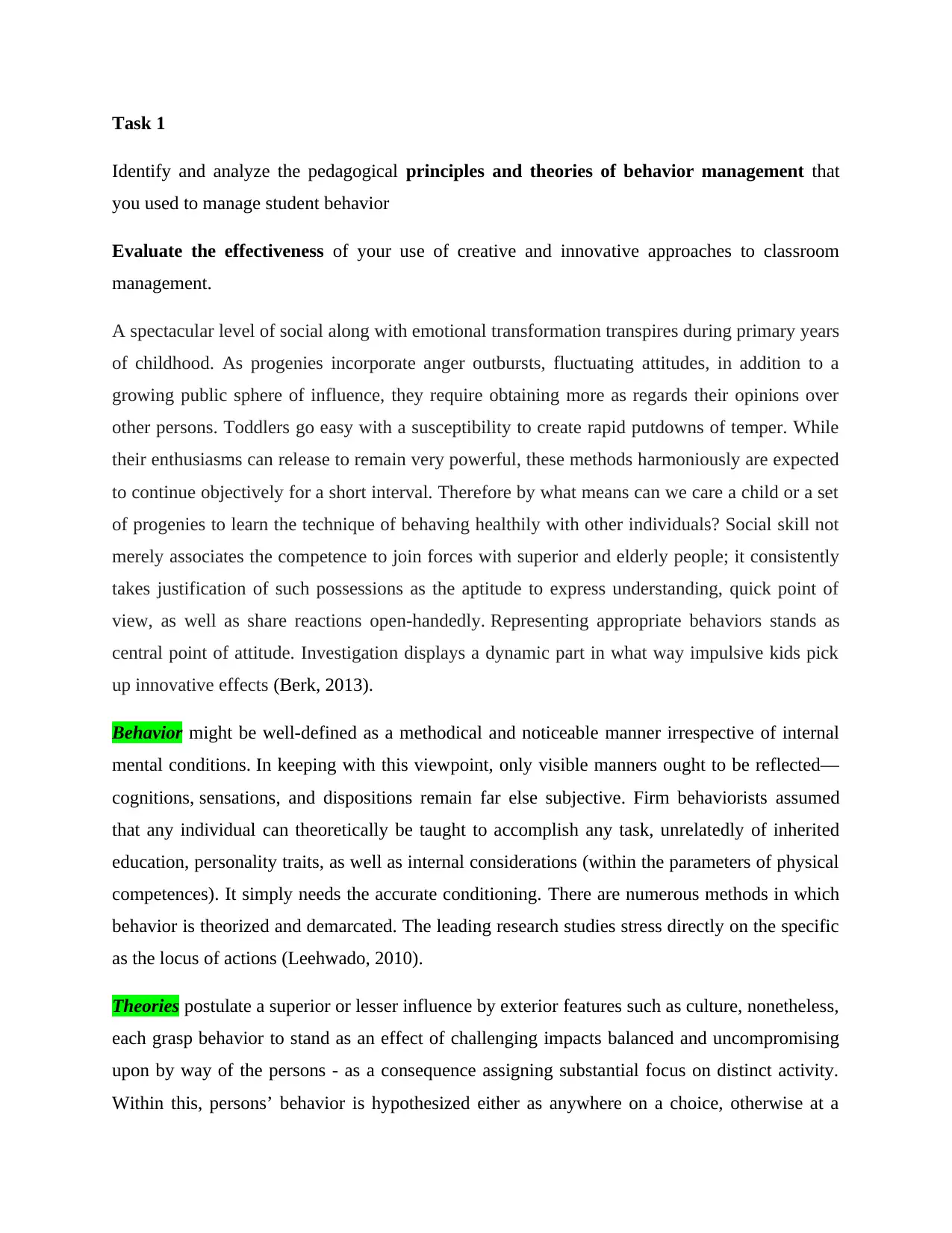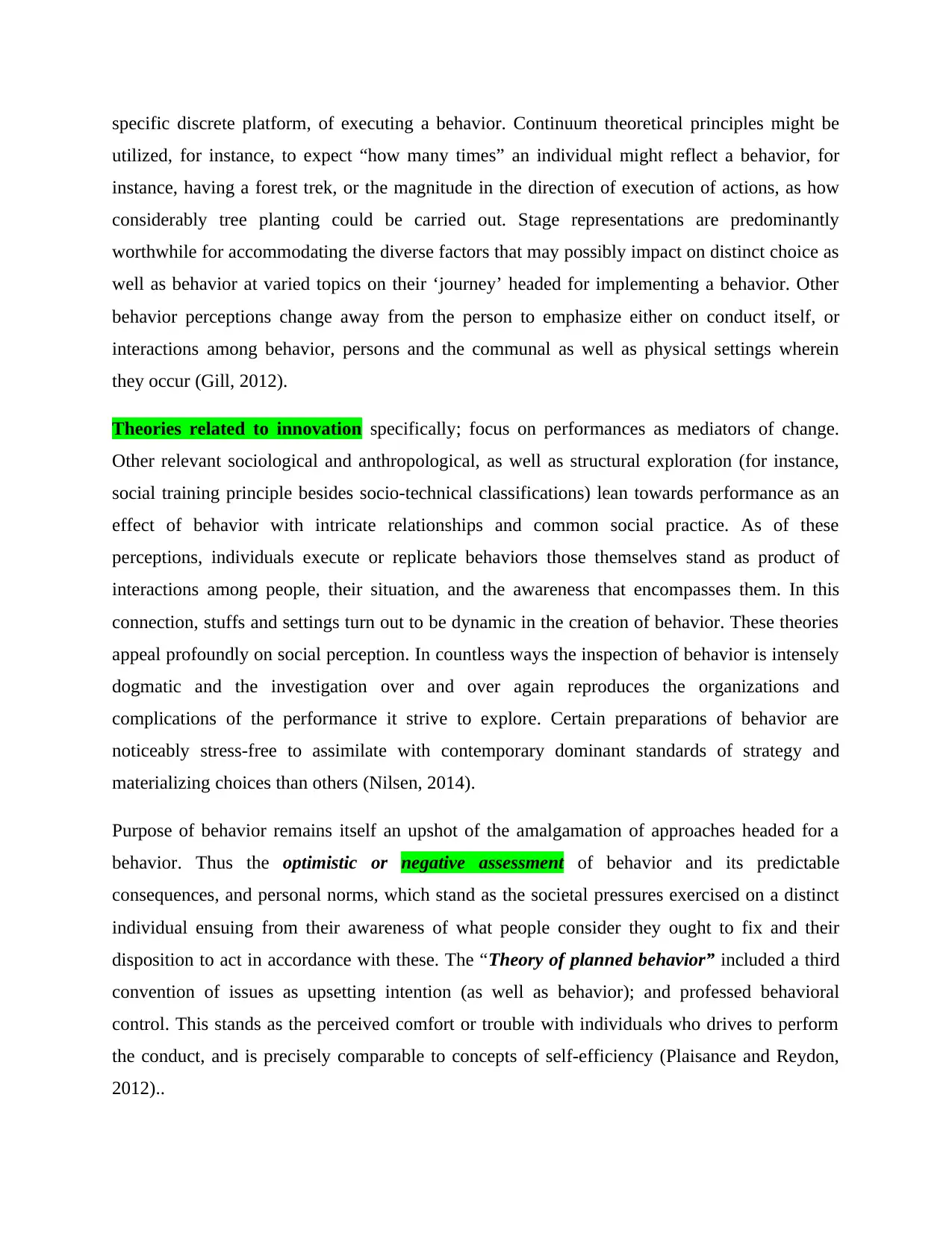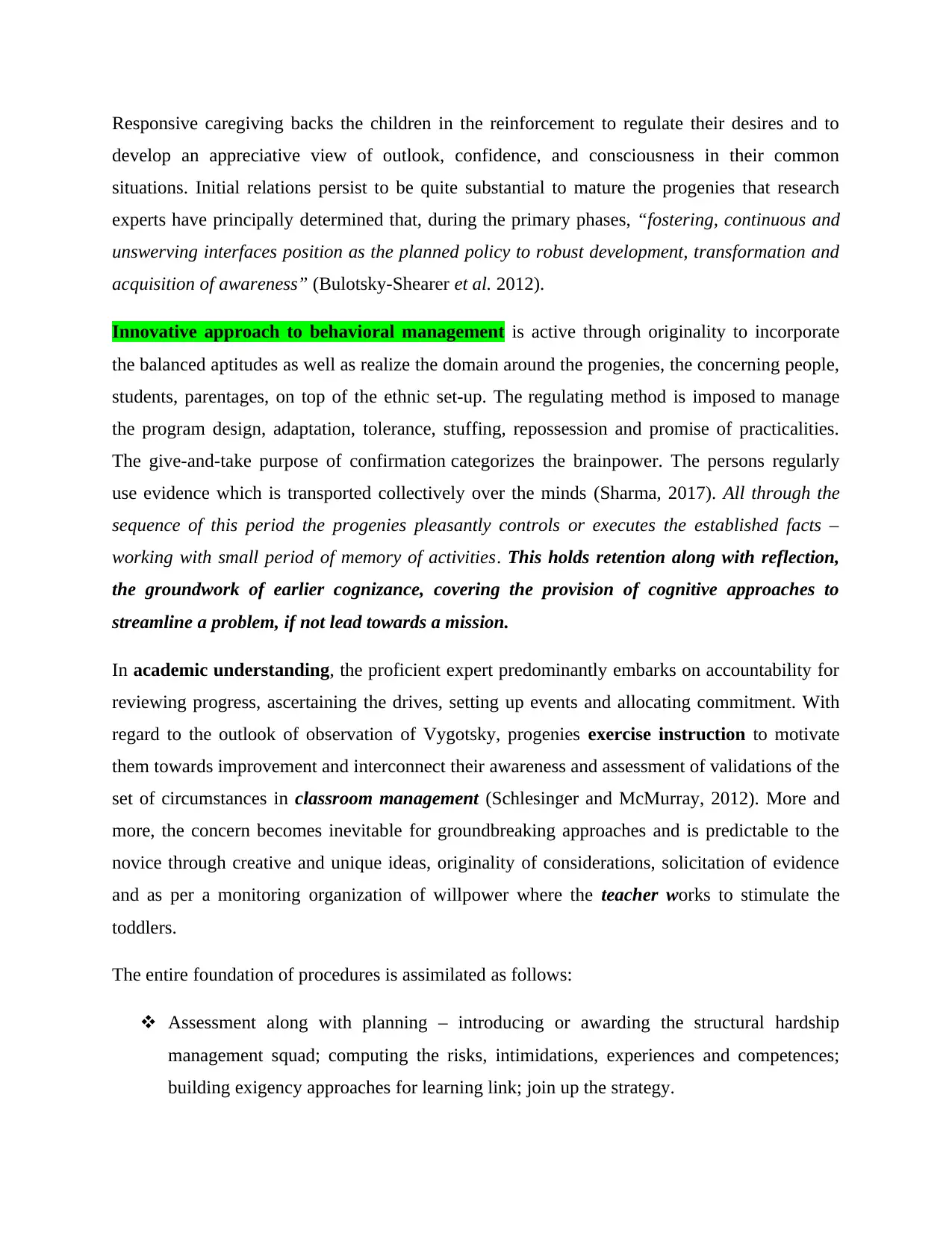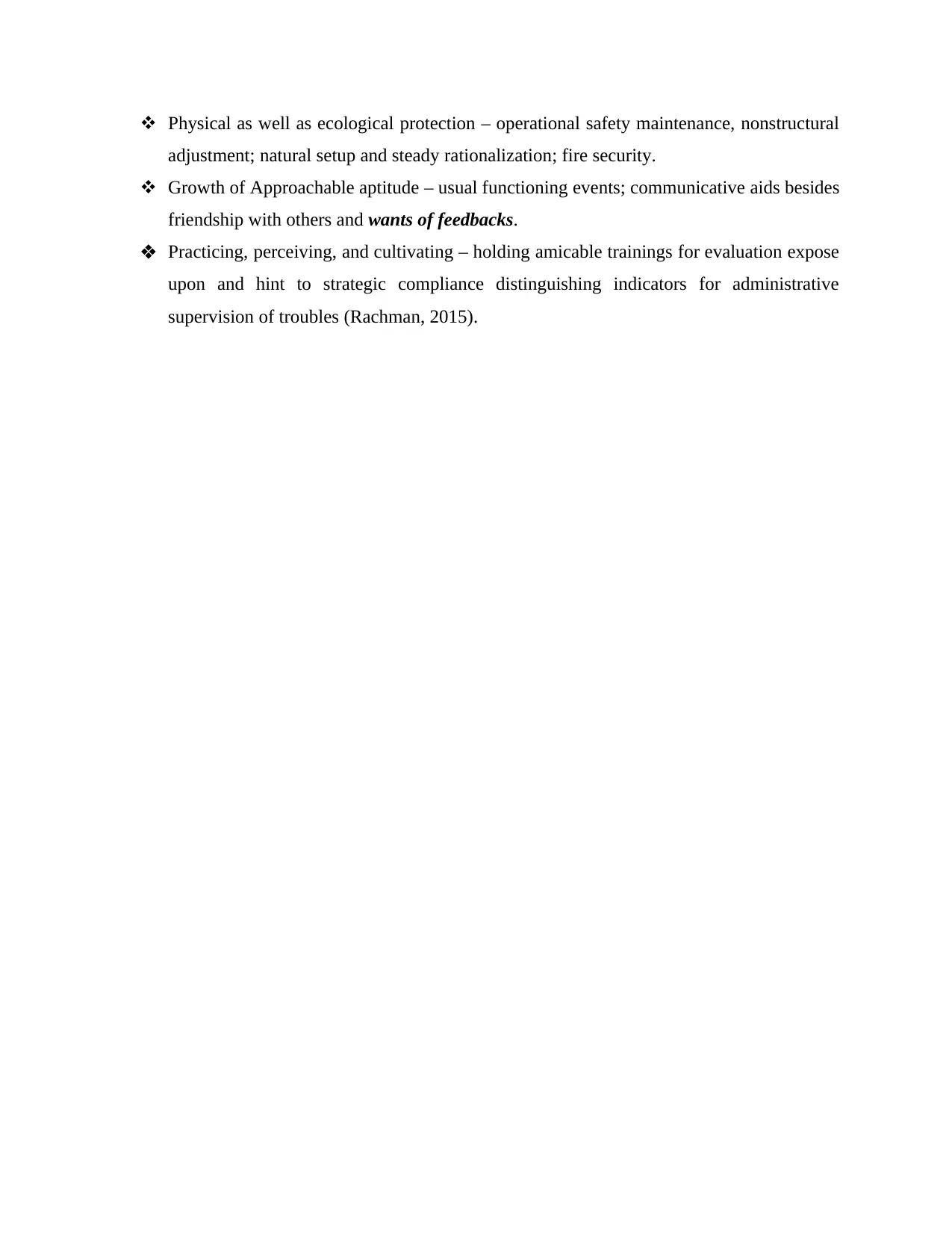Pedagogical Principles and Theories of Behavior Management in Classroom
VerifiedAdded on 2022/10/10
|4
|1288
|231
AI Summary
This article discusses the pedagogical principles and theories of behavior management used to manage student behavior in the classroom. It evaluates the effectiveness of creative and innovative approaches to classroom management. The article emphasizes the importance of social and emotional transformation during primary years of childhood and how responsive caregiving can help children regulate their desires and develop an appreciative view of outlook, confidence, and consciousness in their common situations.
Contribute Materials
Your contribution can guide someone’s learning journey. Share your
documents today.

Task 1
Identify and analyze the pedagogical principles and theories of behavior management that
you used to manage student behavior
Evaluate the effectiveness of your use of creative and innovative approaches to classroom
management.
A spectacular level of social along with emotional transformation transpires during primary years
of childhood. As progenies incorporate anger outbursts, fluctuating attitudes, in addition to a
growing public sphere of influence, they require obtaining more as regards their opinions over
other persons. Toddlers go easy with a susceptibility to create rapid putdowns of temper. While
their enthusiasms can release to remain very powerful, these methods harmoniously are expected
to continue objectively for a short interval. Therefore by what means can we care a child or a set
of progenies to learn the technique of behaving healthily with other individuals? Social skill not
merely associates the competence to join forces with superior and elderly people; it consistently
takes justification of such possessions as the aptitude to express understanding, quick point of
view, as well as share reactions open-handedly. Representing appropriate behaviors stands as
central point of attitude. Investigation displays a dynamic part in what way impulsive kids pick
up innovative effects (Berk, 2013).
Behavior might be well-defined as a methodical and noticeable manner irrespective of internal
mental conditions. In keeping with this viewpoint, only visible manners ought to be reflected—
cognitions, sensations, and dispositions remain far else subjective. Firm behaviorists assumed
that any individual can theoretically be taught to accomplish any task, unrelatedly of inherited
education, personality traits, as well as internal considerations (within the parameters of physical
competences). It simply needs the accurate conditioning. There are numerous methods in which
behavior is theorized and demarcated. The leading research studies stress directly on the specific
as the locus of actions (Leehwado, 2010).
Theories postulate a superior or lesser influence by exterior features such as culture, nonetheless,
each grasp behavior to stand as an effect of challenging impacts balanced and uncompromising
upon by way of the persons - as a consequence assigning substantial focus on distinct activity.
Within this, persons’ behavior is hypothesized either as anywhere on a choice, otherwise at a
Identify and analyze the pedagogical principles and theories of behavior management that
you used to manage student behavior
Evaluate the effectiveness of your use of creative and innovative approaches to classroom
management.
A spectacular level of social along with emotional transformation transpires during primary years
of childhood. As progenies incorporate anger outbursts, fluctuating attitudes, in addition to a
growing public sphere of influence, they require obtaining more as regards their opinions over
other persons. Toddlers go easy with a susceptibility to create rapid putdowns of temper. While
their enthusiasms can release to remain very powerful, these methods harmoniously are expected
to continue objectively for a short interval. Therefore by what means can we care a child or a set
of progenies to learn the technique of behaving healthily with other individuals? Social skill not
merely associates the competence to join forces with superior and elderly people; it consistently
takes justification of such possessions as the aptitude to express understanding, quick point of
view, as well as share reactions open-handedly. Representing appropriate behaviors stands as
central point of attitude. Investigation displays a dynamic part in what way impulsive kids pick
up innovative effects (Berk, 2013).
Behavior might be well-defined as a methodical and noticeable manner irrespective of internal
mental conditions. In keeping with this viewpoint, only visible manners ought to be reflected—
cognitions, sensations, and dispositions remain far else subjective. Firm behaviorists assumed
that any individual can theoretically be taught to accomplish any task, unrelatedly of inherited
education, personality traits, as well as internal considerations (within the parameters of physical
competences). It simply needs the accurate conditioning. There are numerous methods in which
behavior is theorized and demarcated. The leading research studies stress directly on the specific
as the locus of actions (Leehwado, 2010).
Theories postulate a superior or lesser influence by exterior features such as culture, nonetheless,
each grasp behavior to stand as an effect of challenging impacts balanced and uncompromising
upon by way of the persons - as a consequence assigning substantial focus on distinct activity.
Within this, persons’ behavior is hypothesized either as anywhere on a choice, otherwise at a
Secure Best Marks with AI Grader
Need help grading? Try our AI Grader for instant feedback on your assignments.

specific discrete platform, of executing a behavior. Continuum theoretical principles might be
utilized, for instance, to expect “how many times” an individual might reflect a behavior, for
instance, having a forest trek, or the magnitude in the direction of execution of actions, as how
considerably tree planting could be carried out. Stage representations are predominantly
worthwhile for accommodating the diverse factors that may possibly impact on distinct choice as
well as behavior at varied topics on their ‘journey’ headed for implementing a behavior. Other
behavior perceptions change away from the person to emphasize either on conduct itself, or
interactions among behavior, persons and the communal as well as physical settings wherein
they occur (Gill, 2012).
Theories related to innovation specifically; focus on performances as mediators of change.
Other relevant sociological and anthropological, as well as structural exploration (for instance,
social training principle besides socio-technical classifications) lean towards performance as an
effect of behavior with intricate relationships and common social practice. As of these
perceptions, individuals execute or replicate behaviors those themselves stand as product of
interactions among people, their situation, and the awareness that encompasses them. In this
connection, stuffs and settings turn out to be dynamic in the creation of behavior. These theories
appeal profoundly on social perception. In countless ways the inspection of behavior is intensely
dogmatic and the investigation over and over again reproduces the organizations and
complications of the performance it strive to explore. Certain preparations of behavior are
noticeably stress-free to assimilate with contemporary dominant standards of strategy and
materializing choices than others (Nilsen, 2014).
Purpose of behavior remains itself an upshot of the amalgamation of approaches headed for a
behavior. Thus the optimistic or negative assessment of behavior and its predictable
consequences, and personal norms, which stand as the societal pressures exercised on a distinct
individual ensuing from their awareness of what people consider they ought to fix and their
disposition to act in accordance with these. The “Theory of planned behavior” included a third
convention of issues as upsetting intention (as well as behavior); and professed behavioral
control. This stands as the perceived comfort or trouble with individuals who drives to perform
the conduct, and is precisely comparable to concepts of self-efficiency (Plaisance and Reydon,
2012)..
utilized, for instance, to expect “how many times” an individual might reflect a behavior, for
instance, having a forest trek, or the magnitude in the direction of execution of actions, as how
considerably tree planting could be carried out. Stage representations are predominantly
worthwhile for accommodating the diverse factors that may possibly impact on distinct choice as
well as behavior at varied topics on their ‘journey’ headed for implementing a behavior. Other
behavior perceptions change away from the person to emphasize either on conduct itself, or
interactions among behavior, persons and the communal as well as physical settings wherein
they occur (Gill, 2012).
Theories related to innovation specifically; focus on performances as mediators of change.
Other relevant sociological and anthropological, as well as structural exploration (for instance,
social training principle besides socio-technical classifications) lean towards performance as an
effect of behavior with intricate relationships and common social practice. As of these
perceptions, individuals execute or replicate behaviors those themselves stand as product of
interactions among people, their situation, and the awareness that encompasses them. In this
connection, stuffs and settings turn out to be dynamic in the creation of behavior. These theories
appeal profoundly on social perception. In countless ways the inspection of behavior is intensely
dogmatic and the investigation over and over again reproduces the organizations and
complications of the performance it strive to explore. Certain preparations of behavior are
noticeably stress-free to assimilate with contemporary dominant standards of strategy and
materializing choices than others (Nilsen, 2014).
Purpose of behavior remains itself an upshot of the amalgamation of approaches headed for a
behavior. Thus the optimistic or negative assessment of behavior and its predictable
consequences, and personal norms, which stand as the societal pressures exercised on a distinct
individual ensuing from their awareness of what people consider they ought to fix and their
disposition to act in accordance with these. The “Theory of planned behavior” included a third
convention of issues as upsetting intention (as well as behavior); and professed behavioral
control. This stands as the perceived comfort or trouble with individuals who drives to perform
the conduct, and is precisely comparable to concepts of self-efficiency (Plaisance and Reydon,
2012)..

Responsive caregiving backs the children in the reinforcement to regulate their desires and to
develop an appreciative view of outlook, confidence, and consciousness in their common
situations. Initial relations persist to be quite substantial to mature the progenies that research
experts have principally determined that, during the primary phases, “fostering, continuous and
unswerving interfaces position as the planned policy to robust development, transformation and
acquisition of awareness” (Bulotsky-Shearer et al. 2012).
Innovative approach to behavioral management is active through originality to incorporate
the balanced aptitudes as well as realize the domain around the progenies, the concerning people,
students, parentages, on top of the ethnic set-up. The regulating method is imposed to manage
the program design, adaptation, tolerance, stuffing, repossession and promise of practicalities.
The give-and-take purpose of confirmation categorizes the brainpower. The persons regularly
use evidence which is transported collectively over the minds (Sharma, 2017). All through the
sequence of this period the progenies pleasantly controls or executes the established facts –
working with small period of memory of activities. This holds retention along with reflection,
the groundwork of earlier cognizance, covering the provision of cognitive approaches to
streamline a problem, if not lead towards a mission.
In academic understanding, the proficient expert predominantly embarks on accountability for
reviewing progress, ascertaining the drives, setting up events and allocating commitment. With
regard to the outlook of observation of Vygotsky, progenies exercise instruction to motivate
them towards improvement and interconnect their awareness and assessment of validations of the
set of circumstances in classroom management (Schlesinger and McMurray, 2012). More and
more, the concern becomes inevitable for groundbreaking approaches and is predictable to the
novice through creative and unique ideas, originality of considerations, solicitation of evidence
and as per a monitoring organization of willpower where the teacher works to stimulate the
toddlers.
The entire foundation of procedures is assimilated as follows:
Assessment along with planning – introducing or awarding the structural hardship
management squad; computing the risks, intimidations, experiences and competences;
building exigency approaches for learning link; join up the strategy.
develop an appreciative view of outlook, confidence, and consciousness in their common
situations. Initial relations persist to be quite substantial to mature the progenies that research
experts have principally determined that, during the primary phases, “fostering, continuous and
unswerving interfaces position as the planned policy to robust development, transformation and
acquisition of awareness” (Bulotsky-Shearer et al. 2012).
Innovative approach to behavioral management is active through originality to incorporate
the balanced aptitudes as well as realize the domain around the progenies, the concerning people,
students, parentages, on top of the ethnic set-up. The regulating method is imposed to manage
the program design, adaptation, tolerance, stuffing, repossession and promise of practicalities.
The give-and-take purpose of confirmation categorizes the brainpower. The persons regularly
use evidence which is transported collectively over the minds (Sharma, 2017). All through the
sequence of this period the progenies pleasantly controls or executes the established facts –
working with small period of memory of activities. This holds retention along with reflection,
the groundwork of earlier cognizance, covering the provision of cognitive approaches to
streamline a problem, if not lead towards a mission.
In academic understanding, the proficient expert predominantly embarks on accountability for
reviewing progress, ascertaining the drives, setting up events and allocating commitment. With
regard to the outlook of observation of Vygotsky, progenies exercise instruction to motivate
them towards improvement and interconnect their awareness and assessment of validations of the
set of circumstances in classroom management (Schlesinger and McMurray, 2012). More and
more, the concern becomes inevitable for groundbreaking approaches and is predictable to the
novice through creative and unique ideas, originality of considerations, solicitation of evidence
and as per a monitoring organization of willpower where the teacher works to stimulate the
toddlers.
The entire foundation of procedures is assimilated as follows:
Assessment along with planning – introducing or awarding the structural hardship
management squad; computing the risks, intimidations, experiences and competences;
building exigency approaches for learning link; join up the strategy.

Physical as well as ecological protection – operational safety maintenance, nonstructural
adjustment; natural setup and steady rationalization; fire security.
Growth of Approachable aptitude – usual functioning events; communicative aids besides
friendship with others and wants of feedbacks.
Practicing, perceiving, and cultivating – holding amicable trainings for evaluation expose
upon and hint to strategic compliance distinguishing indicators for administrative
supervision of troubles (Rachman, 2015).
adjustment; natural setup and steady rationalization; fire security.
Growth of Approachable aptitude – usual functioning events; communicative aids besides
friendship with others and wants of feedbacks.
Practicing, perceiving, and cultivating – holding amicable trainings for evaluation expose
upon and hint to strategic compliance distinguishing indicators for administrative
supervision of troubles (Rachman, 2015).
1 out of 4
Related Documents
Your All-in-One AI-Powered Toolkit for Academic Success.
+13062052269
info@desklib.com
Available 24*7 on WhatsApp / Email
![[object Object]](/_next/static/media/star-bottom.7253800d.svg)
Unlock your academic potential
© 2024 | Zucol Services PVT LTD | All rights reserved.





